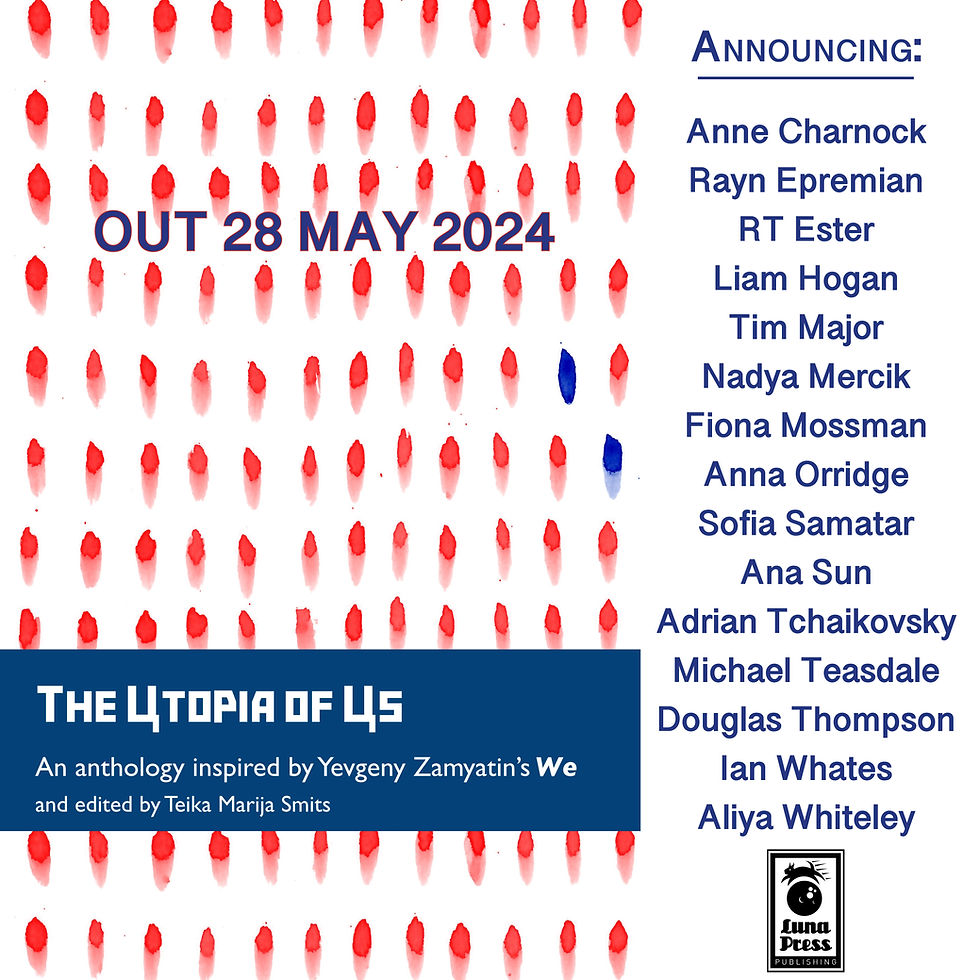
The Utopia of Us anthology is finally out! Editor Teika Marija Smits has brought together 15 incredible writers and their stories, directly inspired by We by Yevgeny Zamyatin.
It is a charity anthology, and given Russia's current war with Ukraine, royalties from the book will be donated to the Ukraine Humanitarian Appeal.
About the editor:
Teika Marija Smits is a UK-based freelance editor and the author of the short story collections Umbilical (NewCon Press) and Waterlore (Black Shuck Books), as well as the poetry pamphlet Russian Doll (Indigo Dreams Publishing). A fan of all things fae, she is delighted by the fact that Teika means fairy tale in Latvian. More information about her work can be found at: teikamarijasmits.com
Teika on the anthology:
A few years ago, on Facebook, I wrote about some of my favourite books, citing 1984 as a novel that had long fascinated me. An old friend from university commented on my post, wondering if I’d read Yevgeny Zamyatin’s We – the inspiration for Orwell’s 1984. Although I was distantly aware of We, my friend’s recommendation gave me the nudge I needed to finally buy myself a copy.
I have a very distinct memory of where I was when I first started reading the novel. It was a cold winter’s day, and I was standing outside my son’s primary school, waiting to pick him up for lunch, the newly bought book in my coat pocket. It had just begun to snow, so I opened the brightly coloured golf umbrella I’d taken with me. As I read the opening of the novel, I was transported to another world. A world I vaguely knew from my Russian mother’s life experiences; the anecdotes of my Latvian father who had also spent time in the Soviet Union. It was both 1984 and not 1984. It was every dystopian film I’d watched, and yet so much deeper, richer. It was also poetic, passionate and absurd. In other words, very Russian. As the snow fell around me, I was conscious of the quiet; the stillness of this beautiful moment.
Of course, the practicalities of life intruded and broke the magic, yet We had cast its spell on me and so in every free moment I returned to Zamyatin’s world. When I came to the end of the book, I was aware that I wasn’t really finished with it. Or rather, it had not finished with me. Later, when I realised that 2024 would be the centenary of its first publication, I knew I had to somehow mark this important anniversary. Having previously edited a number of speculative fiction anthologies, the way forward was obvious. Thus the idea of The Utopia of Us was conceived, and I was delighted when Francesca Barbini of Luna Press Publishing agreed to take on the project.
The response to the call for submissions was incredible – there was so much enthusiasm for the concept of the collection. Reading the submissions was a real pleasure, and bringing together both the chosen stories from the open call and the stories from commissioned authors a creatively enriching process. As always when collating an anthology, I was intrigued to see the connections between the stories: the overlap in themes, tone and voice. Yet each author’s story is unique and compelling in its own way. I’d like to think that I’ve helped to recreate – at least, in part – a little something of my experience of first reading We. I hope these stories transport you; bring a stillness, a hushed beauty, to your day. Most of all, I hope that this anthology inspires more people to discover Zamyatin’s ground-breaking novel.

More on the anthology:
The year 2024 marks the centenary of the first publication of We, the direct inspiration for George Orwell’s 1984, and many other novels, such as Ursula K. Le Guin’s The Dispossessed and Kurt Vonnegut’s Player Piano.
Strikingly, the Russian novel was first published in English, and in the US. Indeed, it wasn’t until 1988 that it was published in the author’s native country. Clearly, this was a book that the people in power in the Soviet Union wanted erased. Yet it ushered in a new genre – the future dystopia – and in doing so gave birth to the many dystopian novels and films which have found their way into our popular culture.
Setting aside what its publication history says about Russia’s past, it also happens to be a beautifully written and page-turning novel, and one that is still currently relevant since it speaks to the very heart of what it means to be human. In short, the centenary of this wonderful novel should be, and needs to be, celebrated, and how better to do that than by a globally minded, independent press, publishing an anthology of science fiction stories inspired by We?

Comments